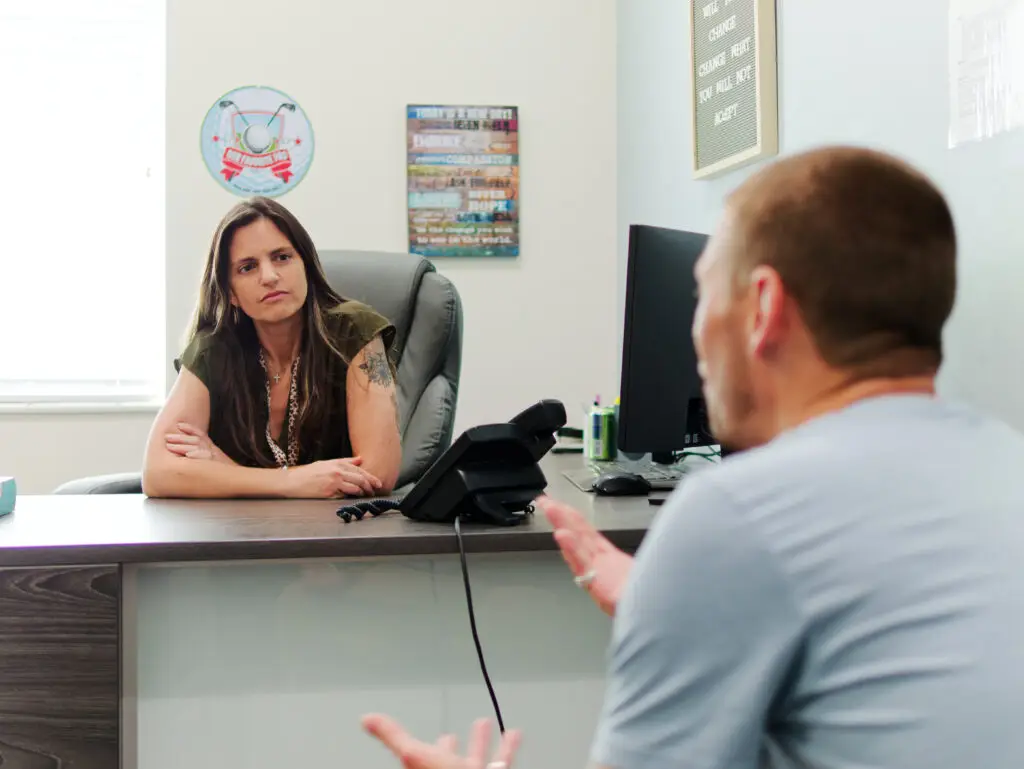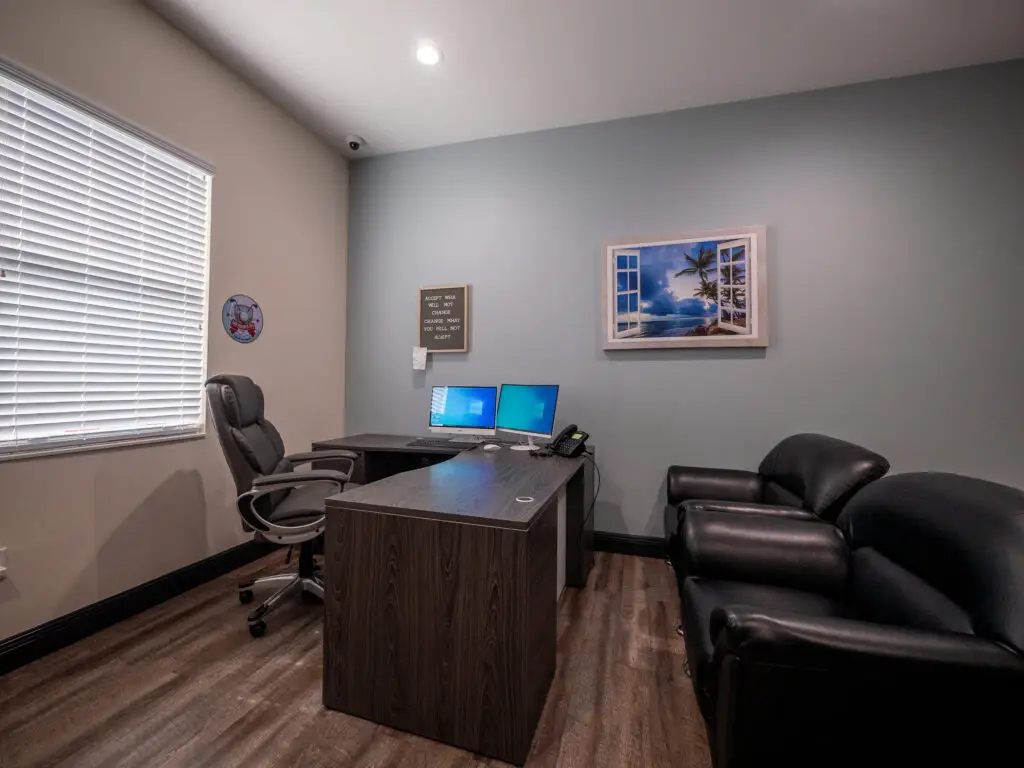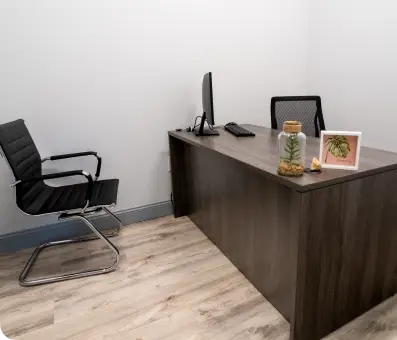Core Therapy
Cognitive Behavioral Therapy (CBT)
CBT is one of the most researched and effective forms of talk therapy for both mental health conditions and substance use disorders. It focuses on identifying harmful thought patterns and replacing them with healthier, more realistic perspectives.
Understanding Cognitive Behavioral Therapy (CBT)
CBT teaches practical skills for recognizing and interrupting unhelpful thinking. Someone working through social anxiety might learn to replace “Everyone is judging me” with “I can’t know what others are thinking, and I’ve handled similar situations before.”
By breaking experiences into thoughts, feelings, and actions, CBT makes it easier to see where small changes can have a big impact.
CBT gives tools that can be used right away and help in all kinds of situations ranging from workplace stress to relapse prevention.
Because CBT is focused on specific goals, progress can be tracked and adjusted. This makes it easier to see changes over time, such as fewer panic attacks, improved mood, or reduced cravings.
CBT doesn't just manage symptoms — it changes the way situations are understood and responded to. By practicing these new patterns until they become second nature, benefiting you long after therapy sessions have ended.




How Cognitive Behavioral Therapy (CBT) Works
Identify the Problem
Starts by pinpointing the thoughts, feelings, and behaviors that are causing distress or keeping you stuck.
Recognize Unhelpful Patterns
Teaches you to spot the negative or distorted thinking that fuels difficult emotions and unhealthy actions.
Challenge and Reframe Thoughts
Tests whether those thoughts are accurate, then replace them with more balanced and constructive perspectives.
Practice New Skills
Applies coping strategies, problem-solving techniques, and healthier behaviors in real-life situations.
Track Progress and Adjust
Reviews what's working, address challenges, and refine strategies until the new patterns become second nature.
Experts in Cognitive Behavioral Therapy (CBT)
CBT at The Haven Detox is delivered by master’s-level therapists with decades of combined clinical experience. You work with someone who not only understands the science behind CBT deeply but also knows how to make it practical in your daily life.
Most Common Conditions We Treat With Cognitive Behavioral Therapy (CBT)
CBT is a well-researched therapy option for many different mental health and substance use challenges. While the list below highlights the most common diagnosis, every person’s situation is unique, and CBT can be adapted to meet those specific needs.
Alcohol Use Disorder
Helps identify the thoughts and situations that trigger drinking and replaces them with healthier coping skills to prevent relapse.
Opioid Use Disorder
Addresses cravings and high-risk thinking patterns, teaching practical strategies to manage stress and avoid triggers without using.
Depression
Targets the negative thinking cycles that keep depression going and replaces them with more balanced, realistic perspectives to improve mood.
Anxiety Disorders
Breaks the connection between anxious thoughts and physical symptoms by challenging fears and practicing calming techniques.
Post-Traumatic Stress Disorder (PTSD)
Guides processing of traumatic memories in a safe, structured way while reducing the fear, guilt, or avoidance that can come with them.
Bipolar Disorder
Supports mood stability by recognizing early signs of mood changes, improving decision-making, and building healthier routines.
Sleep Disorders
Improves sleep by using CBT for insomnia to change negative thought patterns and build healthier bedtime routines.
A Supportive CBT Setting
CBT works best when practiced in a space that feels safe, calm, and focused. Every part of the environment here — from quiet therapy rooms to open, welcoming common areas — is designed to support the deep reflection, skill practice, and personal breakthroughs that make this therapy so effective.
CBT Counseling Session
comfortable mental health
therapy office
Private Cognitive
Behavioral Therapy
Cognitive Behavioral Therapy (CBT) Is Available at all The Haven Detox Locations
Find a facility near you or get away on a wellness retreat for intensive Cognitive Behavioral Therapy (CBT). CBT is one of more than 20 different therapy options here. Our programs include specialized cognitive behavioral interventions at all facilities, including West Memphis, Arkansas and Green Valley, Arizona.

The Haven Detox - Arizona
Space Available
CBT Offered
Insurance Accepted

The Haven Detox - Little Rock
Space Available
CBT Offered
Insurance Accepted

The Haven Detox - New Jersey
Space Available
CBT Offered
Insurance Accepted

The Haven Detox - West Memphis
Space Available
CBT Offered
Insurance Accepted

The Haven Detox - Florida
Space Available
CBT Offered
Insurance Accepted

The Haven Detox - New England
Space Available
CBT Offered
Insurance Accepted

The Haven Detox - Puerto Rico
Space Available
CBT Offered
Insurance Accepted
Treatment Success Stories
Real people who find healing through Cognitive Behavioral Therapy (CBT) at The Haven Detox.
Blake M
If you’re looking for a safe, secure, and loving way to get sober and start a new chapter of life in your recovery. This place has some of the most amazing staff, that without them, this life changing experience would not have been possible.
Sabrina L
This is hands down the best detox in South Florida if not all of Florida. The facility is clean and the staff is so amazing. They really care about their clients and they go above and beyond for you. I would highly recommend it to anyone.
Arthur R
Most wonderful place I have been to in all of Florida. Great staff, clean rooms, smart TVs, lost of walk around room, attentive personnel, good beds and fantastic food! Highly recommended!!
Insurance & Cost Information for Cognitive Behavioral Therapy (CBT)
Most insurance plans cover CBT, especially when part of a mental health or substance use treatment plan. A free online verification can confirm your specific policy — without anyone knowing you inquired.
Frequently Asked Questions About Cognitive Behavioral Therapy (CBT)
How is CBT different from other types of therapy?
CBT focuses on how your current thoughts affect your feelings and behaviors right now — not just exploring your past. For example, instead of focusing only on why drinking became your way to cope, CBT helps you spot the thought (“I can’t handle stress without alcohol”), test it against reality, and replace it with a more balanced one (“I’ve handled stress before without drinking, and I am doing well using my breathing techniques now”). It’s active, practical, and skill-based, so you leave sessions with tools you can start using immediately.
How long does CBT usually take to work?
Many people start noticing changes within 4–6 sessions, especially if the skills are practiced outside of therapy. More complex issues or co-occurring conditions require more sessions, but progress can usually be tracked week by week.
Can CBT be combined with medication?
Yes — CBT often works best alongside medication, especially for depression, anxiety, bipolar disorder, or severe mood symptoms. For example, someone starting an antidepressant might use CBT to manage negative thinking while the medication helps regulate mood, creating faster and more lasting improvement than either approach alone.
What does a typical CBT session look like?
Sessions are structured and focused. A therapist will often check in on your mood, review what’s happened since the last meeting, and work on specific situations you’ve faced. You might practice challenging a stressful thought, role-play a difficult conversation, or make a plan for handling an upcoming trigger — like a family gathering where drugs will be present.
Are there studies showing CBT works for my specific condition?
CBT is one of the most researched therapies globally and is often considered a “gold standard” for anxiety, depression, PTSD, and substance use disorders.
Some highlights:
- People who completed CBT had more than a 2x lower relapse rate after stopping antidepressants ⓘ
- After CBT, relapse within 3–12 months was reported at just 0–14% in randomized trials for anxiety-related disorders. ⓘ
- For bipolar disorder, adding CBT to medication reduced relapse odds by about half and improved depression and mania severity if relapse did occur. ⓘ
- CBT yielded ~15–26% better outcomes for substance use disorder patients. ⓘ
Does CBT work for people who have tried therapy before without success?
Yes, especially if previous therapy was more open-ended or insight-based. Someone who’s only had unstructured “talk therapy” might find CBT’s clear steps, homework, and skill practice feel more purposeful and easier to apply in daily life.
How do I know if CBT is right for my situation?
CBT is a good fit if your symptoms are fueled by negative thinking, avoidance, or unhelpful coping behaviors. It can help with everything from managing workplace stress to reducing relapse risk after detox.
Can CBT help if I have more than one condition, like depression and substance use?
Yes, CBT can address multiple conditions at the same time. For example, it might help you spot how hopeless thinking (“I’ll never get better”) drives both drinking and depression, and teach ways to challenge that thought so it loses its power over both issues.
Will CBT work if I’m not comfortable talking about my past?
Yes — CBT focuses on your current challenges and the thoughts, feelings, and behaviors happening today. You can still make significant progress without sharing detailed personal history. For example, you might work on panic attacks or cravings by examining what’s happening now and how to respond differently.
Have Questions? Let’s Talk!
Call the free 24/7 helpline to get answers and a plan for treatment that’s best for your specific medical and insurance situation — even if it’s not with us.
24/7 Support
Need someone to talk to? We’re always here—day or night.
No Commitment
Ask questions, get guidance—no pressure, no obligation.
100% Private
Your story stays with us. Confidential support, always.





